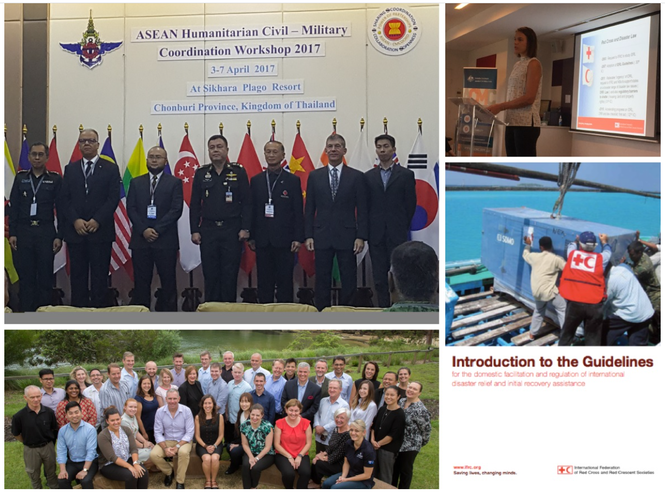
Military and civil defence assets in Asia-Pacific countries are often the first capabilities engaged in a domestic response, as well as offered by neighbouring states, and can make a valuable contribution in responding to natural disasters. However, the modus operandi of these mechanisms should be well regulated and coordinated with humanitarian organisations who share the same space.
The IFRC presented its work on disaster law at the Civil-Military Interaction Workshop ‘Delivering ‘Joined-up’ Government: Achieving the Integrated Approach to Offshore Crisis Management’, hosted by the Australian Civil-Military Centre, 19-24 March 2017 in Sydney, Australia. This presentation explored how National Red Cross and Red Crescent Societies support their authorities in developing and applying state-of-the-art disaster-related legislation, policies and procedures. Challenges that arise during large-scale disaster response, including the presence of foreign civil and military actors, can be addressed through procedures for international disaster relief that put domestic authorities in the driver’s seat, reduce barriers, costs and quality problems, and uphold humanitarian principles.
The IDRL guidelines, set out non-binding recommendations based on best practices and norms as well as existing international instruments, including the Oslo Guidelines on the use of Foreign Military and Civil Defence Assets in Disaster Relief, to to help governments reduce potential barriers to international assistance while reaffirming the primary role of domestic actors. IFRC joined with Ministries of Foreign Affairs and other government agencies from Australia, New Zealand, Singapore, Indonesia, Japan, UK, and US, as well as Australian and foreign military, UNOCHA, Australian Red Cross and civil society including Save the Children, MSF and Action Aid to increase understanding of the various actors’ mandates and how coordination can be improved to support people affected by disasters.
The disaster law team also joined the ASEAN Civil Military Coordination meeting in Thailand 4-5 April 2017, presenting on the IDRL Guidelines’ suggested standards on the initiation of military relief. The participants were especially interested to understand how various states have undertaken the process of utilizing the IDRL Guidelines to strengthen their own domestic laws, as well as the ongoing process for the adoption of the draft articles on the “Protection of Persons in the Event of Disasters”, spearheaded by the International Law Commission. The proposed Standards on Humanitarian Civil-Military Coordination was presented by UN OCHA on the same event, and IFRC provided an overview of RCRC Movement principles on civil military coordination which can be a helpful reference for the drafting of the Standards.